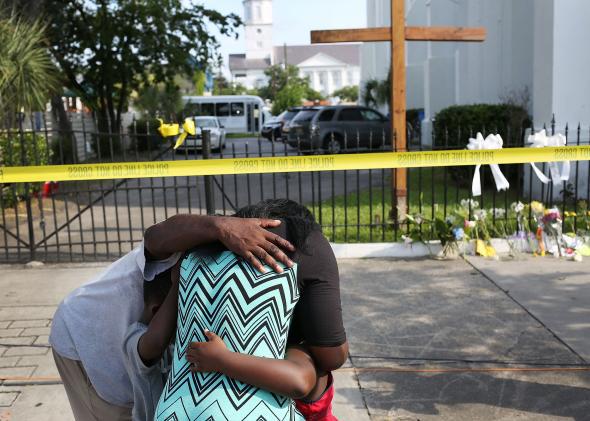“When Barack Obama was elected president more than six years ago, many Americans saw this as evidence that the country was overcoming its legacy of hatred of blacks,” writes Clemens Wergin, Washington correspondent for the German newspaper Die Welt. “In fact, race relations have now arrived at a new low.”
That pretty much sums of the tenor of the international media reaction to the massacre in Charleston on Wednesday, which has focused on the endurance of racial tension in America, despite the election of an African-American president.
“The first black president in U.S. history has been powerless to change a country that, despite many successes, remains profoundly marked by racism,” editorialized France’s Le Monde. The paper also criticized the Republican Party’s resistance to gun control, noting with incredulity that South Carolina Senator Lindsey Graham is himself a proud gun owner. “Part of the political class bears a heavy responsibility for these mass murders,” the editorial argues.
“A church massacre in the heart of the Old South has reopened the most enduring wound in American life: the legacy of slavery,” begins Canada’s Globe and Mail’s coverage of the attack, which also notes “The massacre struck an especially deep chord because it recalled a past of church burnings, killings and kidnappings that terrorized Southern blacks well into the civil rights era.”
As with recent events in Ferguson, state-affiliated media in countries that are normally on the receiving end of criticism from the United States over their human rights records and treatment of ethnic minorities took the opportunity to point out that America is a long way from perfect. “Analysts said that unless U.S. President Barack Obama’s government really reflects on his country’s deep-rooted issues like racial discrimination and social inequality and takes concrete actions on gun control, such tragedy will hardly be prevented from happening again,” writes the Chinese news wire Xinhua.
Not surprisingly, the case has drawn interest in Zimbabwe and South Africa. In the widely-circulated Facebook photo of suspect Dylann Roof, he is shown wearing patches featuring the flags of Rhodesia—the white-dominated state that preceded modern Zimbabwe—and apartheid South Africa. As my colleague Jeremy Stahl noted yesterday, these flags have been appropriated by white supremacists in the United States.
The South African news website News24 reports that despite the flag, Roof “does not seem to have any links to the country.” However, the case has brought up some painful memories for South Africans. The Mail and Guardian newspaper says the incident is “eerily reminiscent of Pretoria’s Strijdom Square in 1988, when Barend Strydom, 21, shot and killed seven black South Africans.”
An article in Zimbabwe’s The Herald refers to Roof as a “Rhodie,” quoting extensively from a Vox explainer on Rhodesia’s importance to American white supremacists. The government-owned paper also takes the opportunity to tweak the U.S. for its criticism of Robert Mugabe’s regime, saying that President Obama, despite his mourning for the victims of white supremacist terror this week, “ironically extended his country’s sanctions regime on Zimbabwe for daring to correct Rhodesian injustices.”
